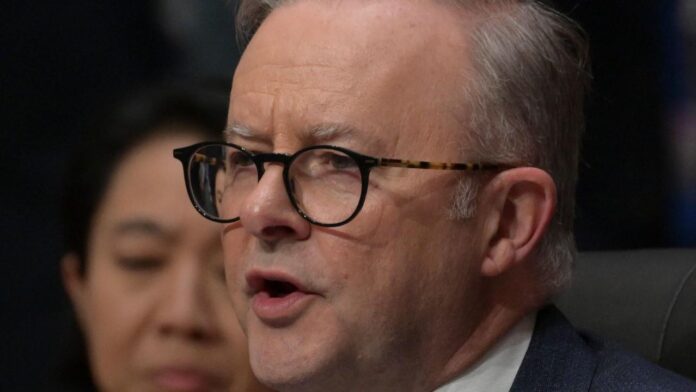[ad_1]
Anthony Albanese has carefully tread around questions about Beijing ahead of significant talks with Southeast Asian leaders in Melbourne this week.
The prime minister will meet with leaders from Indonesia, Singapore, Vietnam and Malaysia for a three-day ASEAN-Australia Special Summit in Melbourne.
The historic gathering comes after the head of Australia’s national security agency warned that Australia was becoming an increasing target of interference and espionage by hostile foreign states.
Ahead of a meeting with Malaysian Prime Minister Anwar Ibrahim on Monday, Mr Albanese said his “big focus” during this week’s talks will be on promoting jobs and economic security in the region.
“Security is always a part of that – ASEAN nations represent Australia’s second largest trading partner,” Mr Albanese told ABC Radio Sydney.
“We’ve got more than a million Australians here who have heritage from the Philippines or Indonesia or Vietnam and we think it’s a real opportunity to come together to discuss our common interests. “
Asked about how much the rise of China will dominate discussions among leaders, Defence Minister Richard Marles said strengthening economic and security partnerships would be front and centre.
“Obviously, we will talk about China in the sense that they are part of the global landscape – but the meeting is not about China,” he told ABC News Breakfast.
“The defence of Australia doesn’t mean that much unless we have a stable and peaceful and secure Southeast Asia.
“And so, we feel deeply connected both in an economic and a security sense with ASEAN, and I think that those countries feel the same in relation to Australia, which is why there is such a significant turnout of ASEAN.”
After the summit kicked off on Monday, Foreign Minister Penny Wong announced $40m in new funding to enhance maritime partnerships with Southeast Asian nations.
The funding will largely go towards marine conservation and training, but will also help to facilitate joint naval patrols in the South China Sea.
Australia struck a strategic partnership with the Philippines late last year to conduct a joint naval operation in the critical waterway, which sees more than $3bn of ship-borne commerce each year.
China claims almost the entire South China Sea, with parts claimed by the Philippines, Vietnam, Indonesia, Malaysia and Brunei.
Foreign minister Penny Wong also announced a further $222.5m in funding for the Mekong subregion of southeast Asia.
The funding will be drawn over the next five years will focus on “improving water security, responding to climate change and combating transnational crime.
“Australia will contribute to strengthen leadership, institutions, and people to people connections to promote shared prosperity,” Senator Wong told the event.
ASEAN was formed in 1967 by Indonesia, Malaysia, the Philippines, Singapore and Thailand. Brunei, Vietnam, Laos, Myanmar and Cambodia joined in later years to make up today’s 10 Member States of ASEAN. Australia became a dialogue partner in 1974.
[ad_2]
Source link


